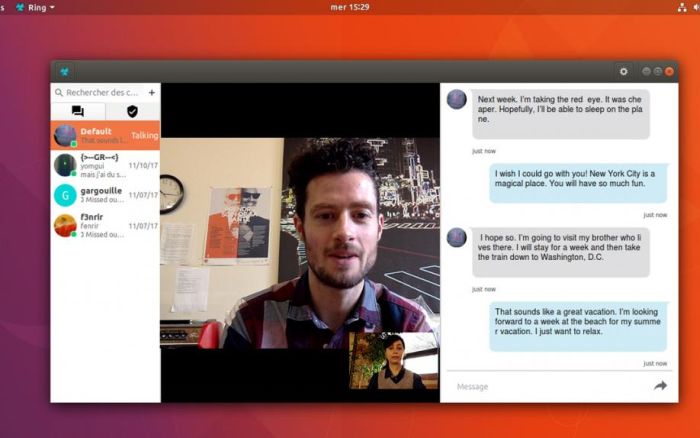Jami (formerly GNU Ring and SFLphone) is an open source SIP-compatible softphone and SIP-based instant messenger for Linux, Microsoft Windows, Mac OS X and Android.
With this software you can make calls, create conferences with multiple participants, share media, send text messages during calls or out of calls.
Ring is also designed as a building block for IoT projects.
Features include:
- SIP-compatible with OpenDHT support.
- Unlimited number of calls.
- Instant messaging.
- Searchable call history.
- Call recording.
- Attended call transfer.
- Automatic call answering.
- Call holding.
- Audio and video calls with multi-party audio and experimentally video conferencing.
- Multi-channel audio support (experimental).
- Streaming of video and audio files during a call.
- TLS and SRTP support.
- Multiple audio codecs supported: G711u, G711a, GSM, Speex (8, 16, 32 kHz), Opus, G.722 (silence detection supported with Speex).
- Multiple SIP accounts support, with per-account STUN support and SIP presence subscription.
- DTMF support.
- Automatic Gain Control.
- Account assistant wizard.
- Global keyboard shortcuts.
- Flac and Vorbis ringtone support.
- Desktop notification: voicemail number, incoming call, information messages.
- SIP Re-invite.
- Address book integration in GNOME and KDE.
- PulseAudio support.
- Jack Audio Connection Kit support.
- Automatic opening of incoming URL.
- Decentralized.
- End-to-end encryption with authentication used for chat, video and voice.
- Identity managed by X.509 certificates.
- Based on RSA/AES/DTLS/SRTP technologies.
- Official packages for Debian, Fedora, and Ubuntu. Other Linux distributions are also supported.
- Internationalization support – French, English, Russian, German, Chinese, Spanish, Italian, and Vietnamese
Website: jami.net
Support: Blog
Developer: Savoir-faire Linux
License: GNU General Public License v3.0 or later
Jami software relies on various components which interact together. They are divided into four layers.
- LibRingClient – facilitates clients’ portability between operating systems.
- D-BUS – enables communication between LibRingClient and LibRing.
- LibRing – involved in all commands.
- Four external libraries:
- OpenDHT – a lightweight C++11 Distributed Hash Table implementation.
- PJSIP – the open SIP protocol.
- GNU TLS – a secure communications library implementing the SSL, TLS and DTLS protocols and technologies around them.
- LibAV FFMPEG – codecs for compressing and decompressing it during the transport.

Jami is written in C and C++. Learn C with our recommended free books and free tutorials. Learn C++ with our recommended free books and free tutorials.
Return to Instant Messaging | Return to VoIP
| Popular series | |
|---|---|
| The largest compilation of the best free and open source software in the universe. Each article is supplied with a legendary ratings chart helping you to make informed decisions. | |
| Hundreds of in-depth reviews offering our unbiased and expert opinion on software. We offer helpful and impartial information. | |
| The Big List of Active Linux Distros is a large compilation of actively developed Linux distributions. | |
| Replace proprietary software with open source alternatives: Google, Microsoft, Apple, Adobe, IBM, Autodesk, Oracle, Atlassian, Corel, Cisco, Intuit, and SAS. | |
| Awesome Free Linux Games Tools showcases a series of tools that making gaming on Linux a more pleasurable experience. This is a new series. | |
| Machine Learning explores practical applications of machine learning and deep learning from a Linux perspective. We've written reviews of more than 40 self-hosted apps. All are free and open source. | |
| New to Linux? Read our Linux for Starters series. We start right at the basics and teach you everything you need to know to get started with Linux. | |
| Alternatives to popular CLI tools showcases essential tools that are modern replacements for core Linux utilities. | |
| Essential Linux system tools focuses on small, indispensable utilities, useful for system administrators as well as regular users. | |
| Linux utilities to maximise your productivity. Small, indispensable tools, useful for anyone running a Linux machine. | |
| Surveys popular streaming services from a Linux perspective: Amazon Music Unlimited, Myuzi, Spotify, Deezer, Tidal. | |
| Saving Money with Linux looks at how you can reduce your energy bills running Linux. | |
| Home computers became commonplace in the 1980s. Emulate home computers including the Commodore 64, Amiga, Atari ST, ZX81, Amstrad CPC, and ZX Spectrum. | |
| Now and Then examines how promising open source software fared over the years. It can be a bumpy ride. | |
| Linux at Home looks at a range of home activities where Linux can play its part, making the most of our time at home, keeping active and engaged. | |
| Linux Candy reveals the lighter side of Linux. Have some fun and escape from the daily drudgery. | |
| Getting Started with Docker helps you master Docker, a set of platform as a service products that delivers software in packages called containers. | |
| Best Free Android Apps. We showcase free Android apps that are definitely worth downloading. There's a strict eligibility criteria for inclusion in this series. | |
| These best free books accelerate your learning of every programming language. Learn a new language today! | |
| These free tutorials offer the perfect tonic to our free programming books series. | |
| Linux Around The World showcases usergroups that are relevant to Linux enthusiasts. Great ways to meet up with fellow enthusiasts. | |
| Stars and Stripes is an occasional series looking at the impact of Linux in the USA. | |
